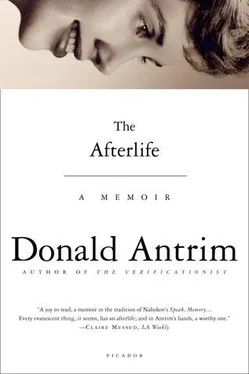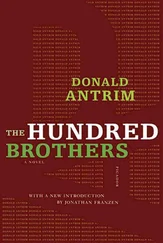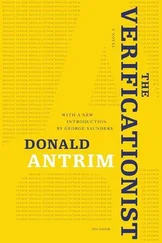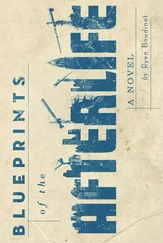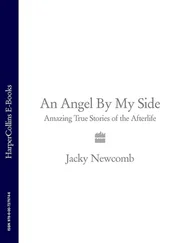Playing the role of guardian, playing at being powerful, I asked if she thought a martini a good idea, and she answered, quite sensibly, “What harm could it do now?”
Had there been gin and vermouth in the house, I would surely have mixed her a cocktail. Or maybe I wouldn’t have. Did I offer her a taste of beer? I don’t remember. Was she still taking oxygen? I can’t remember that, either. Green tanks and plastic hoses were everywhere. The part-time nurse practitioner, a sweet and competent, though hardly medically knowledgeable, hard-line Christian fundamentalist, and my mother’s two female friends, pagan Wiccans as far as I could make out, were in a battle over my mother’s soul. It was a minor flare-up of social conflicts in the New South of the old Appalachias — the Christers versus the Shamans — staged over the proxy that was Louanne Antrim’s wasted body. Back and forth it went, in whispered private conferences, little peace talks out in the yard:
“They’re saying occult things. They’re going to hand her over to the Devil. I’ve got three churches praying for your mom to rise into Jesus’ arms.”
“That Pentecostal girl’s trying to convert Louanne to Christ. Your mother left organized religion behind a long time ago. It’s not what she wants.”
“Every time I pray for your mom, they come in and they stop me. I’m just worried sick over your mom.”
In the end, it fell to me to administer the morphine. I should say that I decided, as the man on the scene, to be the one to give the morphine. Every four hours, I pressed a lorazepam tablet to powder in a spoon, introduced into this powder a small measure of the liquid morphine, drew the solution into an oral syringe, and squirted the drug into my mother’s partly open mouth. I was careful to squirt toward the side of her mouth. My sister and I swabbed her dry lips with sponges. On the third night her death rattle began. I put on Mozart piano sonatas, but after a while, getting into the spirit of things, I switched to Miles Davis. At some point before dawn, my mother’s face relaxed and her skin cleared, and, though her throat and chest still rattled terribly, she smiled. It was a broad, unambiguous smile. Terry said to me, “Look, she’s getting younger.” It was true. In the hours before she died, Louanne began to resemble herself as the young woman we had seen in photographs taken before we were born — full of radiance and with her future and whatever crazed or credible hopes she had ahead of her. Amazingly, this effect occurred in spite of the absence of teeth. I sat in a chair beside the bed and read to her from The Collected Stories of Peter Taylor , which she did not seem to appreciate at all — her smile vanished and she actually scowled at the opening to “A Wife of Nashville”—and, though I like Peter Taylor well enough, I felt in that instant real camaraderie with my mother. I left off reading and told her that she had been a good mother, a good artist; that Terry and I loved her and were grateful to her for her care; that those years in Tallahassee, in particular, had been pretty good years; that both of us, both her children, however much we might miss her, had a great deal to live for; that we would be all right without her. The sun came up. Terry drove back to the hotel for a shower and a nap. The New Agers and the kind Christian were away somewhere; and I held my mother’s hand and told her that the house was empty except for the two of us, it was just her and me in the house, and it was a nice day outside the windows, birds were in the trees, a breeze blew the leaves, clouds crossed the sky, and if she wanted to she could go ahead and die, which she promptly did.
From 1966 until the summer of 1968, my sister and I lived with our mother in Tallahassee, Florida. Across the street from us was a church whose steeple had been removed and laid on its side to peel and rust in the yard beside the church. At the top of the street was a gas station where Apalachicola oysters could be bought for five dollars a bushel. Our father was teaching in Virginia; though our parents’ first divorce was either final or on the way to being so, he visited monthly, pulling up in his black Volkswagen Beetle, parking in the driveway made of seashells and sand — the cue for Terry and me to rush from the house screaming with excitement. Often, the first evening of his visit we would spend as a family, sitting on the concrete-and-brick porch, shucking and eating dozens of oysters and looking out at the church with its decapitated, useless steeple. My sister and I conspire to remember these as good years, primarily because there was sparingly little head-to-head conflict between our parents, given that they were infrequently together; but also because the three of us, Terry, my mother, and I, became a family of our own, a family that existed in the absence of the family we wished we could be. Terry and I did fine in school; we rode our bikes, built forts using lawn furniture, played with friends from across the street. I joined the Cub Scouts; she was a Brownie. Occasionally, our mother allowed us to stay home from school, and our party of three became a tea party in the living room. There was something approaching normalcy in our lives. In retrospect, I would say that it was a forced normalcy. Our happy family was a worrisomely happy performance of family.
This calls to mind a particular event. When I was nine, I got to play the part of Young Macduff in a Florida State University production of Macbeth . My mother worked as an assistant costumer in the theater department. It was she who would eventually make my costume, a yellow-orange tunic with a sash for a belt. The tunic, despite repeated washing, became bloodier and bloodier with each performance. Here are some lines from act IV, scene 2, spoken by Lady Macduff and her son, before they are murdered by Macbeth’s henchmen:
L. MACD.: Sirrah, your father’s dead,
And what will you do now? How will you live?
SON: As birds do, mother.
L. MACD.: What, with worms and flies?
SON: With what I get, I mean; and so do they.
L. MACD.: Poor bird! thou’dst never fear the net nor lime,
The pitfall nor the gin.
SON: Why should I, mother? Poor birds they are not set for.
My father is not dead, for all your saying.
L. MACD.: Yes, he is dead. How wilt thou do for a father?
SON: Nay, how will you do for a husband?
And:
SON: Was my father a traitor, mother?
L. MACD.: Ay, that he was.
SON: What is a traitor?
L. MACD.: Why, one that swears and lies.
SON: And be all traitors that do so?
L. MACD.: Every one that does so is a traitor, and must be hang’d.
It is but a moment before the killers enter. The stage directions call for Young Macduff to be murdered first, crying out, “He has kill’d me, mother: Run away, I pray you!” and for her to flee into the wings, crying “Murther!” In our production, both deaths occurred onstage. First I went down, stabbed in the back and in the stomach. My pretend mother ran to my side and knelt beside me. Then she was killed. She fell across me and lay dead (though breathing heavily). It was in this way that I came to fall in love with Lady Macduff. I mean that I fell in love with Janice, the college girl playing Lady Macduff. The lights dimmed to end the scene. Each night, I watched from beneath my mother who was not my mother, as the lights’ filaments faded; and, when the stage fell dark, I whispered in Janice’s ear, which was practically in my mouth, “Okay, get up,” because the smell of her, and her hair falling across my face, and her ear in my mouth, and the pressure and heat of her body pressing down on mine became too intense to bear.
It seems to me that some of the archetypes for my adult life were introduced during the period of the play: the man who appears and withdraws, appears and withdraws; the woman who is both my mother and a girl on whom I have a crush; and the real mother, who dies for want of the love and protection of a man, her husband. These are rudimentary formulations; nevertheless, they point to a fact of large consequence, the fact of my precarious victory over my father and my attainment of my mother. Like Young Macduff in the moments before death, I became my mother’s confidant. In doing so, I became her true husband, the man both like and unlike other men. And, in becoming these things, I became sick.
Читать дальше
